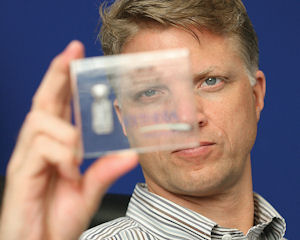Clearly double chins are not in style. While other drug companies were forced to slash prices on their initial public offerings this year, investors are liking what they see in Kythera Biopharmaceuticals Inc. The Calabasas aesthetics firm has a promising treatment to literally dissolve chin fat, and when it went to market on Oct. 11 it expected that its shares would trade at $16. Instead, they opened more than $2 higher and closed at $23.93 on Oct. 24. The company managed to raise $72.6 million in the process, giving it an impressive $416 million market cap. “Cosmetic biopharmaceuticals may be the wave of the future with the rapidly aging baby boomers,” said Joel Balbien, managing director of GreenTech Consulting, a Thousand Oaks firm that advises many local biotech firms on venture capital funding. Even more impressive? The company successfully joined a few biotech firms that have gone public without a product on the market, hoping to finance clinical trials as venture capital runs out. Perhaps the reason is its lead product, which is entering the last phase of clinical trials in the United States. The product, which has been receiving positive reviews in clinical trials, uses a synthetically produced chemical that mimics human bile – which breaks down fat during digestion – to break down fat cells. While a recommended course of treatment is not yet final, in the most recent trial, volunteers received injections up to six times in eight months. Kythera also has a big strategic partner in German pharmaceutical giant, Bayer AG., which is already pursuing regulatory approval of the product in Europe, and has the licensing rights outside the U.S. and Canada. Founded in 2005, Kythera until recently funded its research with venture capital funding from investors including Versant Ventures Inc., ARCH Venture Partners and Prospect Venture Partners. But that well had started to run dry. In September 2011, it raised $37.4 million in a Series D round, though it also has received $76.8 million from Bayer in staggered payments. Keith Leonard, Kythera’s founder and chief executive, who started out his career at Amgen in 1991 and worked there until 2004, had actually wanted to have an IPO back in 2009. But that was impossible. The company declined to speak with the Business Journal, citing a quiet period following the close of its IPO, but Leonard has publicly stated that the economic downturn had closed the door on an earlier stock offering. Still, Kythera managed to hang on even as many other aesthetics companies and clinical stage firms closed up shop or were acquired by the larger companies, such as when Solta Medical bought up competitors including Reliant Technologies Inc., Aesthera Corp. and Medicis Technologies Corp. Johanna Beckman, a spokeswoman for Solta, said she was surprised by the success of the IPO, but noted that products that promise to reduce fat are a hit with investors. “That was unusual. Most companies wait until they at least have one solid product on the market, if only to look better in the eyes of investors,” she said. Getting to market While Kythera is currently focused on its chin-reducing product, ATX-101, it also has a product to reduce smile lines in the works, and had worked on an acne product, but shelved that in 2007. The company has said in the past that it eventually will look to diversify its product line and find medical applications it, but for now, it appears it will rely on Americans’ increasing desire to look better through cosmetic treatments. “Even in this economy, aesthetic products are coming back with a vengeance. It dipped in 2007 and 2008, but people are getting tired of not spending money on themselves,” Beckman said. There are issues though with reimbursement. Balbien, the consultant, said if patients want to use the chin product for cosmetic purposes, the will have to pay for it themselves. “No insurance company, and certainly not a nearly bankrupt Medicare, will pay for aesthetic medicine except for injured troops or other seriously disfigured patients, so I’m not sure about the ultimate size of the market for Kythera’s products,” he said. Still, the company is projecting annual sales of $500 million for the product, though it has not released prices. For now, Kythera will use the IPO funding to focus on completing the U.S. clinical trials, which it anticipates will be done by early next year. If all goes well, it can begin the regulatory process with the Food and Drug Administration. Given its high profile-backing and high sales estimates, observers will be watching. “It will be interesting to see if Kythera can hold their $400 million valuation,” Balbien said.
